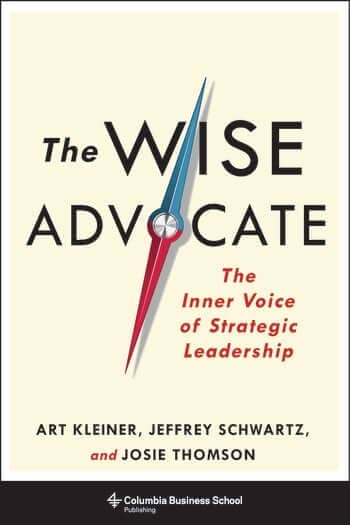Podcast: Download
Subscribe: Apple Podcasts | RSS
 The Wise Advocate wants to help you avoid the terrible habits that keep you locked into habitual thinking…
The Wise Advocate wants to help you avoid the terrible habits that keep you locked into habitual thinking…
Thinking that is deeply connected to your memory.
Yet, after reading a new book on the topic, I was puzzled…
Why in the 21st century are we sophisticated humans still being yanked around by our lizard brain?
Especially in the midst of so much knowledge about how the brain and memory works?
I’m talking about impulsive thoughts, terrible decision making and paying too much attention to horrible mental content that arises in memory.
To find out, I asked co-authors of The Wise Advocate: The Inner Voice of Strategic Leadership to explain.
In this incredible new book, Jeffrey Schwartz, Josie Thomson and Art Kleiner provide simple ways to overcome impulsive thinking and create greater leadership in your life and for others.
About the Authors of The Wise Advocate
Jeffrey Schwartz is a research psychiatrist at UCLA and a leader expert in neuroplasticity. He is the author of You Are Not Your Brain and books on overcoming obsessive-compulsive disorder amongst other topics.
Josie Thomson is an award-winning executive coach, speaker, author, and two-time cancer survivor.
Art Kleiner is the Editor-in-Chief of strategy+business and author of The Age of Heretics and Who Really Matters: The Core Group Theory of Power, Privilege and Success.
Show Notes And Stand Out Topics
Since my passion for memory can get the best of me in matters of business, I was very interested in the discussion of creating more distance and rationality in decision making.
Plus, I learned a lot from the discussion on group think, or tribe mentality, and how to overcome some of the knee-jerk reaction to appease others we see happening more and more on the Internet.
As a solution, Jeffrey suggested a kind of self-inquiry in place of visceral reactions:
“You become more aware of who you’re trying to please, why you’re trying to please that group, that person. [Thinking instead] ‘What are the implications of what you’re doing?’ You start planning and thinking more long-term.”
Finding Your Wise Advocate Is A Trainable Skill
When we train ourselves to contemplate questions like, “Why do they (others) want that?” we open ourselves up to being an impartial spectator of the world.
This impartiality leads us into a higher level of thinking to overcome this “lizard brain.”
If you want to know how your decision making can drastically improve with a shift in focus, or a directed, conscious effort to revamp your mindset in order to be a better leader, or even just lifelong learner, this podcast is for you.
You will unlock the secrets to active mindfulness through simple practice and awareness to be a quality, individualistic, strategic decision maker.
All you need to do is press play above and you’ll learn:
- What exactly mindfulness is and how it can help you clarify your own goals, objectives, and ways of approaching everything in life
- How to be transparent in your own thinking to achieve your long-term goals and plans
- How memory can set you free with decision parameters that you make every day
- The inner narrative of “gut impulses” versus the big picture of decision making
- Identifying the difference between emotional reasoning and rationalizing
- How obsessive-compulsive disorder relates to brain structure and value judgements
- Understanding how you arrive at decisions gives you wiser choice options
- The idea that habits are largely unconscious
- The concept of mentalizing (not “What do others want?” but “What are they thinking and why?”)
- How the desire for “fitting in” influences our decision making
- How community-oriented perspectives achieve win-wins in business relationships
- Rewiring the brain to a “wise advocate” frame of mind to inform decision making (for students who want to know how to study fast, this one will be key)
- Applying the understanding of human behavior to goal-oriented activities
- Deceptive brain messaging in the role of executive thinking
- Self-directed neuroplasticity as an influencer of thought and attention of focus
- Balancing non-judgmental thinking with assessment in your thought processes
- How memory practice and working memory is important in taming impulsive behavior
- The four steps to correct the cognitive distortions you might be making every single day
Although The Wise Advocate is directed at people in leadership roles, I highly recommend this book to all memory improvement fans.
After all, you are the leader of your memory. It needs you to be performing at your best!
Further Resources on the Web, This Podcast, and the MMM Blog:
Homepage of Jeffrey M. Schwartz, M.D.
Further Reading from Art Kleiner
Order The Wise Advocate from Amazon
More About Habits (How to Hack Habits with Joanna Jast)
Goal-Setting with Memory Palaces
Related Posts
- Memory Improvement Techniques For Kids
You're never too young to get started with memory techniques
- How to Improve Memory: 18+ Proven Memory Improvement Tips
Do you want to know how to improve memory? This ultimate guide delivers 18 actionable…





2 Responses
Hello Anthony!
Thank you for another great episode!
I had to check that chinese proverb “The more you sweat in peace, the less you bleed in war.”. The source seems to be the Chinese Generalissimo Chiang Kai-shek in 1939. There are other people referred to this quote after 1939, where those often refers it as a Chinese proverb.
I haven’t been able yet to find actual sources that confirms that Sun Tzu has said this, I think it would make sense if he did. The closest actual find from art of war I find is : “Victorious warriors win first and then go to war, while defeated warriors go to war first and then seek to win.”
This episode was interesting, and in the end I was wondering if you are familiar with general semantics and the book “Science and sanity”, written by Alfred Korzybski?
Thanks for this, Pelle. Thanks too for looking into the source of that quote.
I am generally familiar with Korzybski and have been asked before if I know him. What are your thoughts about his theories?